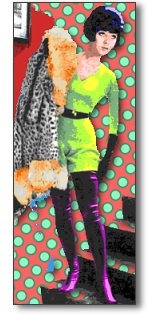 |
|
|
Tara King: The Worst Of All? |
 |
|
c) A Few Hypotheses This lengthy and perhaps a-bit-elusive interval is essential if only to draw up a report detailing the three main reasons that, in my opinion, caused the progressive decline of The Avengers season 6. I'd also like to point out its stereotyped public evaluation-and their dislike of personnel changes; the interference of money men in the free artistic development of the series; the lack of coherence and suitability in its production team.
I've always thought the public showed an impulsive disagreement with season 6 because they did and still do fight, mainly, the radical changes in the aesthetic conception of which we might well have called the "New" Avengers; changes where Tara King hardly represents a small percentage. Likewise, at the very moment of its conception, the eruption of huge American working capitals not only affected the production team, having a decisive influence in the new aesthetic course to take. As I suggested previously, such affluence definitely blocked the canals where creativity flowed through; a creativity that until then, had made of The Avengers an atypical product in the TV business. Earlier, brilliant changes, had always responded to a rather careful criteria, promoting improvements within the same tradition. However, after the show's arrival in the US, a good portion of the aesthetic ruling the market, would end up infecting the successful British formula that turned Mrs Peel into a sort of Monochrome Queen in Colorland. Despite the proliferation of laser lights, positive-negative men, and comic strip characters flowing through their scripts, the first Avengers color season would preserve the basic structure that made the series known throughout the world— a glamorous twosome who knock out the baddies in their secret missions for an enigmatic "Ministry." Season 6 represented a breakdown of that tradition. Although it still complied with certain distinctive "rules" (absence of extras, blood, police officers and dead women, among others) simultaneously added in a crowd of secondary characters, and the legendary two became three, as soon as Mother entered the scene. To say these changes were a sign of the beginning of the end of The Avengers, is only a simplistic, deceptive argument that does not support much analysis. Just watch the wonderful result attained in "Super Secret Cypher Snatch" or "Killer"—wherein a newcomer, Jennifer Croxton, played the lead, adding another newness to the long list. These examples make us realize that the avenging magic could have kept alive if the production had been capable of generating a steady, coherent team, with the suitability sufficient as to fight such changes without any damage to the creative vein. It is hard to understand why competent, innovating directors like Robert Fuest, for instance, were not summoned to the set more frequently. Unfortunately, this was not the case, and as episodes ran, the magic that always made The Avengers a fresh, different show, began to fade away inexorably. As usual, no one likes to take the blame
for failures. That's why the search for a single culprit capable of exonerating
the true authors of the disaster was promptly carried out. This witch-hunt
still continues to this day. Despite the evident wrong turn of the season
in its totality, its general incoherence, its doubtful and not-too-convincing
scenarios, characters, wardrobe and production design in general, everybody
reaches an agreement. If someone has to be blamed for all this flop when
the theory of changes is treated with disdain, the public—and a huge
sector of the press—invariably point their accusatory finger at Tara
King... isn't that too much? |
| Top
of Page Table of Contents |
Copyright of the written material
is owned by its authors Web Design and Digital Art © 2008 - TheAvengers.TV |
 The
birth of this new version of The Avengers in 1968 was determined by two
factors that had much more influence than Diana Rigg's departure. After
all, the series' glamour had began to pale even when she was still there.
Not only the creative concoction that came along with Pop—whose contribution
to general confusion and transforming chaos is more verifiable than its
intrinsic artistic value—played a key role. Also the promise of forthcoming
profits the TV networks quickly foresaw.
The
birth of this new version of The Avengers in 1968 was determined by two
factors that had much more influence than Diana Rigg's departure. After
all, the series' glamour had began to pale even when she was still there.
Not only the creative concoction that came along with Pop—whose contribution
to general confusion and transforming chaos is more verifiable than its
intrinsic artistic value—played a key role. Also the promise of forthcoming
profits the TV networks quickly foresaw.